 Tìm kiếm
Tìm kiếm
Chương I Luật giáo dục 2019: Những quy định chung
| Số hiệu: | 43/2019/QH14 | Loại văn bản: | Luật |
| Nơi ban hành: | Quốc hội | Người ký: | Nguyễn Thị Kim Ngân |
| Ngày ban hành: | 14/06/2019 | Ngày hiệu lực: | 01/07/2020 |
| Ngày công báo: | 20/07/2019 | Số công báo: | Từ số 569 đến số 570 |
| Lĩnh vực: | Giáo dục | Tình trạng: | Còn hiệu lực |
TÓM TẮT VĂN BẢN
Văn bản tiếng việt
Văn bản tiếng anh
Luật này quy định về hệ thống giáo dục quốc dân; cơ sở giáo dục, nhà giáo, người học; quản lý nhà nước về giáo dục; quyền và trách nhiệm của cơ quan, tổ chức, cá nhân liên quan đến hoạt động giáo dục.
Mục tiêu giáo dục nhằm phát triển toàn diện con người Việt Nam có đạo đức, tri thức, văn hóa, sức khỏe, thẩm mỹ và nghề nghiệp; có phẩm chất, năng lực và ý thức công dân; có lòng yêu nước, tinh thần dân tộc, trung thành với lý tưởng độc lập dân tộc và chủ nghĩa xã hội; phát huy tiềm năng, khả năng sáng tạo của mỗi cá nhân; nâng cao dân trí, phát triển nguồn nhân lực, bồi dưỡng nhân tài, đáp ứng yêu cầu của sự nghiệp xây dựng, bảo vệ Tổ quốc và hội nhập quốc tế.
1. Nền giáo dục Việt Nam là nền giáo dục xã hội chủ nghĩa có tính nhân dân, dân tộc, khoa học, hiện đại, lấy chủ nghĩa Mác - Lê nin và tư tưởng Hồ Chí Minh làm nền tảng.
2. Hoạt động giáo dục được thực hiện theo nguyên lý học đi đôi với hành, lý luận gắn liền với thực tiễn, giáo dục nhà trường kết hợp với giáo dục gia đình và giáo dục xã hội.
1. Phát triển giáo dục là quốc sách hàng đầu.
2. Phát triển giáo dục phải gắn với nhu cầu phát triển kinh tế - xã hội, tiến bộ khoa học, công nghệ, củng cố quốc phòng, an ninh; thực hiện chuẩn hóa, hiện đại hóa, xã hội hóa; bảo đảm cân đối cơ cấu ngành nghề, trình độ, nguồn nhân lực và phù hợp vùng miền; mở rộng quy mô trên cơ sở bảo đảm chất lượng và hiệu quả; kết hợp giữa đào tạo và sử dụng.
3. Phát triển hệ thống giáo dục mở, xây dựng xã hội học tập nhằm tạo cơ hội để mọi người được tiếp cận giáo dục, được học tập ở mọi trình độ, mọi hình thức, học tập suốt đời.
Trong Luật này, các từ ngữ dưới đây được hiểu như sau:
1. Giáo dục chính quy là giáo dục theo khóa học trong cơ sở giáo dục để thực hiện một chương trình giáo dục nhất định, được thiết lập theo mục tiêu của các cấp học, trình độ đào tạo và được cấp văn bằng của hệ thống giáo dục quốc dân.
2. Giáo dục thường xuyên là giáo dục để thực hiện một chương trình giáo dục nhất định, được tổ chức linh hoạt về hình thức thực hiện chương trình, thời gian, phương pháp, địa điểm, đáp ứng nhu cầu học tập suốt đời của người học.
3. Kiểm định chất lượng giáo dục là hoạt động đánh giá, công nhận cơ sở giáo dục hoặc chương trình đào tạo đạt tiêu chuẩn chất lượng giáo dục do cơ quan, tổ chức có thẩm quyền ban hành.
4. Niên chế là hình thức tổ chức quá trình giáo dục, đào tạo theo năm học.
5. Tín chỉ là đơn vị dùng để đo lường khối lượng kiến thức, kỹ năng và kết quả học tập đã tích lũy được trong một khoảng thời gian nhất định.
6. Mô-đun là đơn vị học tập được tích hợp giữa kiến thức, kỹ năng và thái độ một cách hoàn chỉnh nhằm giúp cho người học có năng lực thực hiện trọn vẹn một hoặc một số công việc của một nghề.
7. Chuẩn đầu ra là yêu cầu cần đạt về phẩm chất và năng lực của người học sau khi hoàn thành một chương trình giáo dục.
8. Phổ cập giáo dục là quá trình tổ chức hoạt động giáo dục để mọi công dân trong độ tuổi đều được học tập và đạt đến trình độ học vấn nhất định theo quy định của pháp luật.
9. Giáo dục bắt buộc là giáo dục mà mọi công dân trong độ tuổi quy định bắt buộc phải học tập để đạt được trình độ học vấn tối thiểu theo quy định của pháp luật và được Nhà nước bảo đảm điều kiện để thực hiện.
10. Khối lượng kiến thức văn hóa trung học phổ thông là kiến thức, kỹ năng cơ bản, cốt lõi trong chương trình giáo dục trung học phổ thông mà người học phải tích lũy để có thể tiếp tục học trình độ giáo dục nghề nghiệp cao hơn.
11. Nhà đầu tư là tổ chức, cá nhân thực hiện hoạt động đầu tư trong lĩnh vực giáo dục bằng nguồn vốn ngoài ngân sách nhà nước gồm nhà đầu tư trong nước và nhà đầu tư nước ngoài.
12. Cơ sở giáo dục là tổ chức thực hiện hoạt động giáo dục trong hệ thống giáo dục quốc dân gồm nhà trường và cơ sở giáo dục khác.
1. Hệ thống giáo dục quốc dân là hệ thống giáo dục mở, liên thông gồm giáo dục chính quy và giáo dục thường xuyên.
2. Cấp học, trình độ đào tạo của hệ thống giáo dục quốc dân bao gồm:
a) Giáo dục mầm non gồm giáo dục nhà trẻ và giáo dục mẫu giáo;
b) Giáo dục phổ thông gồm giáo dục tiểu học, giáo dục trung học cơ sở và giáo dục trung học phổ thông;
c) Giáo dục nghề nghiệp đào tạo trình độ sơ cấp, trình độ trung cấp, trình độ cao đẳng và các chương trình đào tạo nghề nghiệp khác;
d) Giáo dục đại học đào tạo trình độ đại học, trình độ thạc sĩ và trình độ tiến sĩ.
3. Thủ tướng Chính phủ quyết định phê duyệt Khung cơ cấu hệ thống giáo dục quốc dân và Khung trình độ quốc gia Việt Nam; quy định thời gian đào tạo, tiêu chuẩn cho từng trình độ đào tạo, khối lượng học tập tối thiểu đối với trình độ của giáo dục nghề nghiệp, giáo dục đại học.
4. Bộ trưởng Bộ Giáo dục và Đào tạo, Bộ trưởng Bộ Lao động - Thương binh và Xã hội, trong phạm vi nhiệm vụ, quyền hạn của mình, quy định ngưỡng đầu vào trình độ cao đẳng, trình độ đại học thuộc ngành đào tạo giáo viên và ngành thuộc lĩnh vực sức khỏe.
1. Nội dung giáo dục phải bảo đảm tính cơ bản, toàn diện, thiết thực, hiện đại, có hệ thống và được cập nhật thường xuyên; coi trọng giáo dục tư tưởng, phẩm chất đạo đức và ý thức công dân; kế thừa và phát huy truyền thống tốt đẹp, bản sắc văn hóa dân tộc, tiếp thu tinh hoa văn hóa nhân loại; phù hợp với sự phát triển về thể chất, trí tuệ, tâm sinh lý lứa tuổi và khả năng của người học.
2. Phương pháp giáo dục phải khoa học, phát huy tính tích cực, tự giác, chủ động, tư duy sáng tạo của người học; bồi dưỡng cho người học năng lực tự học và hợp tác, khả năng thực hành, lòng say mê học tập và ý chí vươn lên.
1. Chương trình giáo dục thể hiện mục tiêu giáo dục; quy định chuẩn kiến thức, kỹ năng, yêu cầu cần đạt về phẩm chất và năng lực của người học; phạm vi và cấu trúc nội dung giáo dục; phương pháp và hình thức tổ chức hoạt động giáo dục; cách thức đánh giá kết quả giáo dục đối với các môn học ở mỗi lớp học, mỗi cấp học hoặc các môn học, mô-đun, ngành học đối với từng trình độ đào tạo.
2. Chương trình giáo dục phải bảo đảm tính khoa học và thực tiễn; kế thừa, liên thông giữa các cấp học, trình độ đào tạo; tạo điều kiện cho phân luồng, chuyển đổi giữa các trình độ đào tạo, ngành đào tạo và hình thức giáo dục trong hệ thống giáo dục quốc dân để địa phương và cơ sở giáo dục chủ động triển khai kế hoạch giáo dục phù hợp; đáp ứng mục tiêu bình đẳng giới, yêu cầu hội nhập quốc tế. Chương trình giáo dục là cơ sở bảo đảm chất lượng giáo dục toàn diện.
3. Chuẩn kiến thức, kỹ năng, yêu cầu cần đạt về phẩm chất và năng lực người học quy định trong chương trình giáo dục phải được cụ thể hóa thành sách giáo khoa đối với giáo dục phổ thông; giáo trình và tài liệu giảng dạy đối với giáo dục nghề nghiệp, giáo dục đại học. Sách giáo khoa, giáo trình và tài liệu giảng dạy phải đáp ứng yêu cầu về phương pháp giáo dục.
4. Chương trình giáo dục được tổ chức thực hiện theo năm học đối với giáo dục mầm non và giáo dục phổ thông; theo niên chế hoặc theo phương thức tích lũy mô-đun hoặc tín chỉ hoặc kết hợp giữa tín chỉ và niên chế đối với giáo dục nghề nghiệp, giáo dục đại học.
Kết quả học tập môn học hoặc tín chỉ, mô-đun mà người học tích lũy được khi theo học một chương trình giáo dục được công nhận để xem xét về giá trị chuyển đổi cho môn học hoặc tín chỉ, mô-đun tương ứng trong chương trình giáo dục khác khi người học chuyên ngành, nghề đào tạo, chuyển hình thức học tập hoặc học lên cấp học, trình độ đào tạo cao hơn.
5. Bộ trưởng Bộ Giáo dục và Đào tạo, Bộ trưởng Bộ Lao động - Thương binh và Xã hội, trong phạm vi nhiệm vụ, quyền hạn của mình, quy định việc thực hiện chương trình giáo dục và việc công nhận về giá trị chuyển đổi kết quả học tập trong đào tạo các trình độ của giáo dục đại học, giáo dục nghề nghiệp quy định tại Điều này.
1. Hướng nghiệp trong giáo dục là hệ thống các biện pháp tiến hành trong và ngoài cơ sở giáo dục để giúp học sinh có kiến thức về nghề nghiệp, khả năng lựa chọn nghề nghiệp trên cơ sở kết hợp nguyện vọng, sở trường của cá nhân với nhu cầu sử dụng lao động của xã hội.
2. Phân luồng trong giáo dục là biện pháp tổ chức hoạt động giáo dục trên cơ sở thực hiện hướng nghiệp trong giáo dục, tạo điều kiện để học sinh tốt nghiệp trung học cơ sở, trung học phổ thông tiếp tục học ở cấp học, trình độ cao hơn hoặc theo học giáo dục nghề nghiệp hoặc tham gia lao động phù hợp với năng lực, điều kiện cụ thể của cá nhân và nhu cầu xã hội, góp phần điều tiết cơ cấu ngành nghề của lực lượng lao động phù hợp với yêu cầu phát triển của đất nước.
3. Chính phủ quy định chi tiết hướng nghiệp và phân luồng trong giáo dục theo từng giai đoạn phù hợp với nhu cầu phát triển kinh tế - xã hội.
1. Liên thông trong giáo dục là việc sử dụng kết quả học tập đã có để học tiếp ở các cấp học, trình độ khác cùng ngành, nghề đào tạo hoặc khi chuyển sang ngành, nghề đào tạo, hình thức giáo dục và trình độ đào tạo khác phù hợp với yêu cầu nội dung tương ứng, bảo đảm liên thông giữa các cấp học, trình độ đào tạo trong giáo dục phổ thông, giáo dục nghề nghiệp và giáo dục đại học.
2. Việc liên thông trong giáo dục phải đáp ứng các điều kiện bảo đảm chất lượng. Chương trình giáo dục được thiết kế theo hướng kế thừa, tích hợp kiến thức và kỹ năng dựa trên chuẩn đầu ra của từng bậc trình độ đào tạo trong Khung trình độ quốc gia Việt Nam. Người học không phải học lại kiến thức và kỹ năng đã tích lũy ở các chương trình giáo dục trước đó.
3. Chính phủ quy định chi tiết về liên thông giữa các cấp học, trình độ đào tạo trong hệ thống giáo dục quốc dân.
1. Tiếng Việt là ngôn ngữ chính thức dùng trong cơ sở giáo dục. Căn cứ vào mục tiêu giáo dục và yêu cầu cụ thể về nội dung giáo dục, Chính phủ quy định việc dạy và học bằng tiếng nước ngoài trong cơ sở giáo dục.
2. Nhà nước khuyến khích, tạo điều kiện để người dân tộc thiểu số được học tiếng nói, chữ viết của dân tộc mình theo quy định của Chính phủ; người khuyết tật nghe, nói được học bằng ngôn ngữ ký hiệu, người khuyết tật nhìn được học bằng chữ nổi Braille theo quy định của Luật Người khuyết tật.
3. Ngoại ngữ quy định trong chương trình giáo dục là ngôn ngữ được sử dụng phổ biến trong giao dịch quốc tế. Việc tổ chức dạy ngoại ngữ trong cơ sở giáo dục phải bảo đảm để người học được học liên tục, hiệu quả.
1. Văn bằng của hệ thống giáo dục quốc dân được cấp cho người học sau khi tốt nghiệp cấp học hoặc sau khi hoàn thành chương trình giáo dục, đạt chuẩn đầu ra của trình độ tương ứng theo quy định của Luật này.
2. Văn bằng của hệ thống giáo dục quốc dân gồm bằng tốt nghiệp trung học cơ sở, bằng tốt nghiệp trung học phổ thông, bằng tốt nghiệp trung cấp, bằng tốt nghiệp cao đẳng, bằng cử nhân, bằng thạc sĩ, bằng tiến sĩ và văn bằng trình độ tương đương.
3. Chứng chỉ của hệ thống giáo dục quốc dân được cấp cho người học để xác nhận kết quả học tập sau khi được đào tạo, bồi dưỡng nâng cao trình độ học vấn, nghề nghiệp hoặc cấp cho người học dự thi lấy chứng chỉ theo quy định.
4. Văn bằng, chứng chỉ do cơ sở giáo dục thuộc các loại hình và hình thức đào tạo trong hệ thống giáo dục quốc dân cấp có giá trị pháp lý như nhau.
5. Chính phủ ban hành hệ thống văn bằng giáo dục đại học và quy định văn bằng trình độ tương đương của một số ngành đào tạo chuyên sâu đặc thù.
1. Học tập là quyền và nghĩa vụ của công dân. Mọi công dân không phân biệt dân tộc, tôn giáo, tín ngưỡng, giới tính, đặc điểm cá nhân, nguồn gốc gia đình, địa vị xã hội, hoàn cảnh kinh tế đều bình đẳng về cơ hội học tập.
2. Nhà nước thực hiện công bằng xã hội trong giáo dục, tạo môi trường giáo dục an toàn, bảo đảm giáo dục hòa nhập, tạo điều kiện để người học phát huy tiềm năng, năng khiếu của mình.
3. Nhà nước ưu tiên, tạo điều kiện cho người học là trẻ em có hoàn cảnh đặc biệt theo quy định của Luật Trẻ em, người học là người khuyết tật theo quy định của Luật Người khuyết tật, người học thuộc hộ nghèo và hộ cận nghèo thực hiện quyền và nghĩa vụ học tập.
1. Giáo dục tiểu học là giáo dục bắt buộc.
Nhà nước thực hiện phổ cập giáo dục mầm non cho trẻ em 05 tuổi và phổ cập giáo dục trung học cơ sở.
2. Nhà nước chịu trách nhiệm thực hiện giáo dục bắt buộc trong cả nước; quyết định kế hoạch, bảo đảm các điều kiện để thực hiện phổ cập giáo dục.
3. Mọi công dân trong độ tuổi quy định có nghĩa vụ học tập để thực hiện phổ cập giáo dục và hoàn thành giáo dục bắt buộc.
4. Gia đình, người giám hộ có trách nhiệm tạo điều kiện cho các thành viên của gia đình trong độ tuổi quy định được học tập để thực hiện phổ cập giáo dục và hoàn thành giáo dục bắt buộc.
1. Giáo dục hòa nhập là phương thức giáo dục nhằm đáp ứng nhu cầu và khả năng khác nhau của người học; bảo đảm quyền học tập bình đẳng, chất lượng giáo dục, phù hợp với nhu cầu, đặc điểm và khả năng của người học; tôn trọng sự đa dạng, khác biệt của người học và không phân biệt đối xử.
2. Nhà nước có chính sách hỗ trợ thực hiện giáo dục hòa nhập cho người học là trẻ em có hoàn cảnh đặc biệt theo quy định của Luật Trẻ em, người học là người khuyết tật theo quy định của Luật Người khuyết tật và quy định khác của pháp luật có liên quan.
1. Phát triển giáo dục, xây dựng xã hội học tập là sự nghiệp của Nhà nước và của toàn dân.
2. Nhà nước giữ vai trò chủ đạo trong phát triển sự nghiệp giáo dục. Thực hiện đa dạng hóa các loại hình cơ sở giáo dục và hình thức giáo dục; khuyến khích, huy động và tạo điều kiện để tổ chức, cá nhân tham gia phát triển sự nghiệp giáo dục; khuyến khích phát triển cơ sở giáo dục dân lập, tư thục đáp ứng nhu cầu xã hội về giáo dục chất lượng cao.
3. Tổ chức, gia đình và cá nhân có trách nhiệm chăm lo sự nghiệp giáo dục, phối hợp với cơ sở giáo dục thực hiện mục tiêu giáo dục, xây dựng môi trường giáo dục an toàn, lành mạnh.
4. Tổ chức, cá nhân có thành tích trong sự nghiệp giáo dục được khen thưởng theo quy định của pháp luật.
1. Đầu tư cho giáo dục là đầu tư phát triển. Đầu tư trong lĩnh vực giáo dục là hoạt động đầu tư thuộc ngành, nghề đầu tư kinh doanh có điều kiện và được ưu đãi, hỗ trợ đầu tư theo quy định của pháp luật.
2. Nhà nước ưu tiên đầu tư và thu hút các nguồn đầu tư khác cho giáo dục; ưu tiên đầu tư cho phổ cập giáo dục, phát triển giáo dục ở miền núi, hải đảo, vùng đồng bào dân tộc thiểu số, vùng có điều kiện kinh tế - xã hội đặc biệt khó khăn, địa bàn có khu công nghiệp.
Nhà nước khuyến khích và bảo hộ các quyền, lợi ích hợp pháp của tổ chức, cá nhân trong nước, người Việt Nam định cư ở nước ngoài, tổ chức, cá nhân nước ngoài đầu tư cho giáo dục.
3. Ngân sách nhà nước giữ vai trò chủ đạo trong tổng nguồn lực đầu tư cho giáo dục.
1. Cán bộ quản lý giáo dục giữ vai trò quan trọng trong việc tổ chức, quản lý, điều hành các hoạt động giáo dục.
2. Cán bộ quản lý giáo dục có trách nhiệm học tập, rèn luyện, nâng cao phẩm chất đạo đức, trình độ chuyên môn, năng lực quản lý và thực hiện các chuẩn, quy chuẩn theo quy định của pháp luật.
3. Nhà nước có kế hoạch xây dựng và nâng cao chất lượng đội ngũ cán bộ quản lý giáo dục.
1. Hoạt động khoa học và công nghệ là một nhiệm vụ của cơ sở giáo dục.
2. Cơ sở giáo dục tự triển khai hoặc phối hợp với tổ chức khoa học và công nghệ, cơ sở sản xuất, kinh doanh, dịch vụ trong việc đào tạo, nghiên cứu khoa học và chuyển giao công nghệ, phục vụ phát triển kinh tế - xã hội.
3. Nhà nước tạo điều kiện cho cơ sở giáo dục hoạt động khoa học và công nghệ, kết hợp đào tạo với nghiên cứu khoa học và sản xuất nhằm nâng cao chất lượng giáo dục; xây dựng cơ sở giáo dục thành trung tâm văn hóa, khoa học và công nghệ của địa phương hoặc của cả nước.
4. Nhà nước có chính sách ưu tiên phát triển hoạt động khoa học và công nghệ trong cơ sở giáo dục. Các chủ trương, chính sách về giáo dục phải được xây dựng trên cơ sở kết quả nghiên cứu khoa học phù hợp với thực tiễn Việt Nam và xu hướng quốc tế.
Không truyền bá tôn giáo, tiến hành các lễ nghi tôn giáo trong cơ sở giáo dục của hệ thống giáo dục quốc dân, cơ quan nhà nước, tổ chức chính trị, tổ chức chính trị - xã hội và lực lượng vũ trang nhân dân.
1. Cấm lợi dụng hoạt động giáo dục để xuyên tạc chủ trương, chính sách, pháp luật của Nhà nước, chống lại Nhà nước Cộng hòa xã hội chủ nghĩa Việt Nam, chia rẽ khối đại đoàn kết toàn dân tộc, kích động bạo lực, tuyên truyền chiến tranh xâm lược, phá hoại thuần phong mỹ tục, truyền bá mê tín, hủ tục, lôi kéo người học vào các tệ nạn xã hội.
2. Cấm lợi dụng hoạt động giáo dục vì mục đích vụ lợi.
1. Xúc phạm nhân phẩm, danh dự, xâm phạm thân thể nhà giáo, cán bộ, người lao động của cơ sở giáo dục và người học.
2. Xuyên tạc nội dung giáo dục.
3. Gian lận trong học tập, kiểm tra, thi, tuyển sinh.
4. Hút thuốc; uống rượu, bia; gây rối an ninh, trật tự.
5. Ép buộc học sinh học thêm để thu tiền.
6. Lợi dụng việc tài trợ, ủng hộ giáo dục để ép buộc đóng góp tiền hoặc hiện vật.
GENERAL PROVISIONS
This Law regulates the national educational system; educational institutions, teachers, learners; state management of education; rights and responsibilities of agencies, organisations, individuals taking parts in educational activities.
The goals of education are to educate the Vietnamese into comprehensively developed persons who possess ethics, knowledge, education, physical health, aesthetic sense and profession; to shape and cultivate one's dignity, civic qualifications and competence; to nurture one’s patriotism, national spirit, loyalty to the ideology of national independence and socialism; to develop potentials, creativity of each individual; to improve the people’s knowledge and manpower, to foster talents, satisfying the demands of the construction and defense of the Fatherland and international integration.
Article 3. Characteristics, principles of education
1. The Vietnamese education is a socialism-based education with popular, national, scientific and modern characteristics, based on Marxism-Leninism and Ho Chi Minh's Thoughts.
2. Educational activities must be conducted on the principles of learning coupled with practice, theories connected to practicability, education at school combined with education in the family and in the society.
Article 4. Educational development
1. Educational development is the first national priority.
2. Educational development must be linked with the requirements of socio-economic development, to the scientific-technological advances, to the consolidation of national defense and security; must implement standardisation, modernisation and private sector involvement; must ensure the balance in terms of professional, qualifications, manpower and regional structure; must expand scale on the basis of quality and efficiency assurance; and must link education with employment.
3. Develop an open educational system, build a learning society to provide life-long educational access of every level and every form to all the people.
In this Law, the undermentioned terms shall be defined as follows:
1. “Formal education” means cohort-based education in educational institutions to implement a certain educational programme. It is established following the goals of each educational level and qualification, and the learners are issued degrees/diplomas of the national educational system.
2. “Continuing education” means education that follows a certain educational programme and has flexible organisation regarding programme implementation formats, time, methods, locations, satisfying the learners’ need for lifelong learning.
3. “Education quality accreditation” means assessing and recognizing educational institutions or educational programmes that meet the education quality standards promulgated by competent authorities and organisations.
4. “Year-based” means the mode of educational and training organisation based on school years.
5. “Credit” means a unit used to measure the amount of knowledge, skills and study results accumulated after a certain period of time.
6. “Module” means a learning unit that fully integrates knowledge, skills and attitude with an aim to equipping learners with the capacity to fully or partially perform the tasks of a profession.
7. “Graduation standards” means the target requirements regarding learners’ quality and capacity after completing an educational programme.
8. “Universalization of education” means organizing educational activities in the way that ensures all citizens of suitable age have access to education and acquire certain qualifications as prescribed by law.
9. “Compulsory education” means the type of education that has to be provided to all citizens of suitable age in order for them to acquire the minimal educational qualification as prescribed by law and facilitated by the State.
10. “Upper secondary education knowledge” means the basic and core knowledge and skills in the upper secondary educational programme that learners must accumulate in order to continue learning a higher qualification of vocational education.
11. “Investor” means an organisation or individual making investment in education from financial sources outside of the state budget. There are domestic investors and foreign investors.
12. “Educational institution” means an institution providing education in the national educational system and consists of schools and other educational institutions.
Article 6. The national educational system
1. The national educational system is an open, transferrable educational system consisting of formal education and continuing education.
2. Educational levels and training qualifications of the national educational system include:
a) Preschool education including junior kindergartens (for children aged 03 – 36 months) and senior kindergartens (for children aged 3 – 5 years);
b) General education with primary education, lower secondary education, and upper secondary education;
c) Vocational education and training at elementary-level, intermediate-level, or college-level and other vocational training programmes;
d) Higher education with university education, master education and doctoral education.
3. The Prime Minister shall make decisions on the approval of the structural framework of the national educational system and the Vietnamese Qualifications Framework; stipulate the training duration, standards of each training level, the minimal learning quantity for qualifications of vocational education and higher education.
4. Within the scope of their duties and authorities, the Minister of Education and Training and Minister of Labour - War Invalids and Social Affairs shall provide for the entrance requirements of college-level and university-level pedagogical and health professions.
Article 7. Requirements on contents, methods of education
1. Contents of education must ensure the basic, comprehensive, practical, modern, systematic and up-to-date characteristics; with importance attached to ideological, ethical and civic consciousness education; preserving and developing the good traditions and the national cultural identity, absorbing the essence of the mankind culture; and suitable with the physical, intellectual and psycho-physiology development of various age groups and abilities of learners.
2. Methods of education must be scientific and bring into full play the activeness, consciousness, self-motivation and creative thinking of learners; foster self-study and cooperative abilities, practical ability, learning eagerness and the will to advance forward.
Article 8. Educational programmes
1. Educational programmes shall reflect the goals of education; set the standards for knowledge, skills, requirements on quality and capacity of learners; scope and structure of educational contents; methods and forms of organizing educational activities; evaluation methods of educational outcomes for each subject of every grade and level or for each subject, module, specialization of every training qualification.
2. Educational programmes must ensure the scientific and practical characteristics; inheritability and transferability among different levels and different training qualifications; facilitate the classification of students and exchange between training qualifications, specializations and educational forms in the national educational system in order for localities and educational institutions to proactively implement suitable educational plans; satisfying the goal of gender equality and demands of international integration. Educational programmes are the basis of comprehensive education quality assurance.
3. Requirements on knowledge, skills and on dignity and capacity of learners defined in educational programmes must be concretized in textbooks used for general education, in syllabi and teaching materials used for vocational education and higher education. Textbooks, syllabi and teaching materials must meet the requirements on educational methods.
4. Preschool education and general education shall run year-based programmes; vocational education and higher education may run year-based, module-based, credit-based programmes or combined programmes.
Study results of subjects or credits/modules accumulated by learners after pursuing an educational programme are considered for transferable values for respective subjects or credits/modules of other educational programmes when learners change their educational specializations/professions, forms of studies, or follow higher educational levels or qualifications.
5. Within the scope of their duties and authorities, the Minister of Education and Training and Minister of Labour - War Invalids and Social Affairs shall stipulate the implementation of educational programmes and the recognition of the transferable values of study results of higher education and vocational education levels as prescribed in this Article.
Article 9. Career orientation and student classification
1. Career orientation in education is a system of measures implemented inside and outside educational institutions to provide students with knowledge about professions and the ability to choose a profession based on a combination of personal desires, fortes and social labour demands.
2. Student classification is a measure of organizing educational activities on the basis of career orientation in education, enabling lower secondary and upper secondary graduates to continue with their studies in higher educational levels/qualifications or vocational education or to join the labour force with regard to personal capacity, circumstances and social demands, contributing to the regulation of the professional structure following the developing requirements of the country.
3. The Government shall provide for career orientation and student classification in each period of time, meeting the requirements of socio-economic development.
Article 10. Transferability in education
1. Transferability in education is the act of using available study results to continue studying in other educational levels and qualifications within the same specialization or switch to another specialization, mode of education and training qualification with corresponding content requirements, ensuring transferability between educational levels and training qualifications of general education, vocational education and higher education.
2. Transferability in education must satisfy conditions of quality assurance. Educational programmes shall be designed with inheritability, integrating knowledge and skills based on the graduation standards of each educational level in the Vietnamese Qualifications Framework. Learners shall not have to relearn knowledge and skills accumulated in previous educational programmes.
3. The Government shall provide for the transferability between educational levels/training qualifications in the national educational system.
Article 11. Languages, written languages used in educational institutions
1. Vietnamese is the official language to be used in educational institutions. Based on the goals of education and specific requirements on educational contents, the Government shall stipulate the teaching and learning via foreign languages in educational institutions.
2. The State shall encourage and enable ethnic minority people to learn their spoken and written languages as prescribed in Governmental regulations; hearing-impaired and speaking-impaired persons to learn via sign language, vision-impaired persons to learn via the Braille alphabet as prescribed in the Law on Persons with Disabilities.
3. Foreign languages defined in educational programmes are the languages used commonly in international communication. The teaching of foreign languages in educational institutions should guarantee that learners have continuing and effective learning process.
Article 12. Degrees/diplomas and certificates
1. Degrees/diplomas of the national educational system are conferred to learners upon successful completion of an educational level or educational programme and meeting the graduation standards of the corresponding qualification as prescribed in this Law.
2. Degrees/diplomas of the national educational system consist of the following: lower secondary diploma, upper secondary diploma, diploma of vocational secondary schools, college degree, bachelor degree, master degree, doctoral degree and degrees/diplomas of equivalent qualifications.
3. Certificates of the national educational system are granted to learners to acknowledge their learning results upon successful completion of courses for knowledge or professional upgrading or conferred to candidates of certification examinations as prescribed by law.
4. Degrees/diplomas and certificates granted by educational institutions of educational types and modes in the national educational system shall have equal legal values.
5. The Government shall promulgate a system of higher educational degrees/diplomas and stipulate the equivalent degrees/diplomas of some specific in-depth specializations.
Article 13. Learning rights and obligations of citizens
1. Learning is the right and obligation of every citizen. Every citizen, regardless of ethnic origin, religion, belief, gender, personal characteristics, family background, social status or economic conditions, has equal rights of access to learning opportunities.
2. The State shall ensure social equality in education, create a safe educational environment, ensure inclusive education and enable learners to develop their potentials and talents.
3. The State shall give priority in enabling children with special backgrounds as prescribed in the Children Law, disabled and handicapped persons as prescribed in the Law on Persons with Disabilities and learners from poor and near-poor households to exercise their learning rights and obligations.
Article 14. Universalization of education and compulsory education
1. Primary education is compulsory.
The State shall provide the universalization of preschool education to 05-year-old children and provide the universalization of lower secondary education.
2. The State shall be responsible for implementing compulsory education throughout the country; planning and facilitating the universalization of education.
3. All citizens within defined age groups shall have the obligation to learn in order to contribute to the universalization of education and complete the compulsory education programme.
4. Families and guardians shall enable their members in defined age groups to receive education in order to contribute to the universalization of education and complete the compulsory education programme.
Article 15. Inclusive education
1. Inclusive education is an educational method aiming to meet different needs and abilities of learners; ensure equal learning rights, education quality, suitable with the needs, characteristics and capacity of learners; respect diversity and differences of learners and avoid discrimination.
2. The State shall issue assistance policies to implement inclusive education for learners who are children with special backgrounds as prescribed in the Children Law, learners who are disabled and handicapped persons as prescribed in the Law on Persons with Disabilities and other relevant regulations.
Article 16. Private sector involvement in education
1. To develop education and to build a learning society are the responsibilities of the State and of the whole population.
2. The State shall play the dominant role in developing the cause of education; carry out the diversification of types of educational institutions and modes of education; encourage, promote and enable organisations and individuals to take part in the development of the cause of education; encourage the development of people-founded and private educational institutions, satisfying the social demands on high quality education.
3. All organisations, families and citizens shall be responsible for taking care of education, cooperating with educational institutions in realizing the goals of education and building a safe and healthy educational environment.
4. Organisations and individuals with contributions to the cause of education shall be rewarded in compliance with the law.
Article 17. Investment in education
1. Investment in education is an investment in development. Investment in the field of education is a conditional business investment with preferential treatment and assistance as prescribed by law.
2. The State shall give priority to investment and to the attraction of other investment sources for education; priorities investment in the universalization of education, educational development in mountainous areas, islands, ethnic minority areas, areas with exceptional socio-economic difficulties, areas with industrial zones.
The State shall encourage and protect the legitimate rights and benefits of Vietnamese organisations and individuals, overseas residing Vietnamese, foreign organisations and individuals investing in education.
3. The State budget shall hold the key role in the total resources invested in education.
Article 18. Roles and responsibilities of education managers
1. Education managers play an important role in organizing, managing and directing educational activities.
2. Education managers shall have the responsibilities for studying, training, improving their moral standards, qualifications, management competence and for complying with the standards and regulations prescribed by law.
3. The State shall have plans to build and improve the quality of education managers.
Article 19. Scientific and technological activities
1. Scientific and technological activities are one duty of educational institutions.
2. Educational institutions shall implement or cooperate with scientific and technological organisations and production, trade and service units to carry out education, scientific research and technology transfer for socio-economic development.
3. The State shall enable educational institutions to organize scientific and technological activities, combining training with scientific research and production so as to improve education quality; to gradually implement the role of a cultural, scientific and technological centre for the locality or the whole country.
4. The State shall issue priority policies for the development of scientific and technological activities in educational institutions. Guidelines and policies concerning education must be formulated based on the results of scientific research, appropriate to the Vietnamese reality and international trend.
Article 20. Prohibition of promotion of religions in educational institutions
Neither religion promotion nor religious rituals are to be conducted in educational institutions of the national educational system, of the State agencies, of political organisations, of socio-political organisations and of the people's armed forces.
Article 21. Prohibition of abuse of educational activities
1. It is prohibited to abuse educational activities to distort State guidelines, policies, legislation; to oppose the Socialist Republic of Vietnam, to separate the block of great national solidarity, to incite violence, to propagate war of aggression, to erode the good traditions and customs, to publicize superstitious beliefs and bad customs, or to attract learners into social evils.
2. It is prohibited to make corrupt use of educational activities for self-interest purposes.
Article 22. Prohibited activities in educational institutions
1. Disrespect of dignity and honor, committing physical assault towards teachers, staff, labour workers of educational institutions and towards learners.
2. Distortion of educational contents.
3. Cheating in learning, testing, examination, admission.
4. Smoking; alcohol consumption; security and order disruption.
5. Forcing students to take extra classes for money.
6. Forcing contributions in cash or in kind in the name of educational sponsorship or support.
Cập nhật
Bài viết liên quan
Mẫu đơn xin nhập học Đại học mới nhất 2025
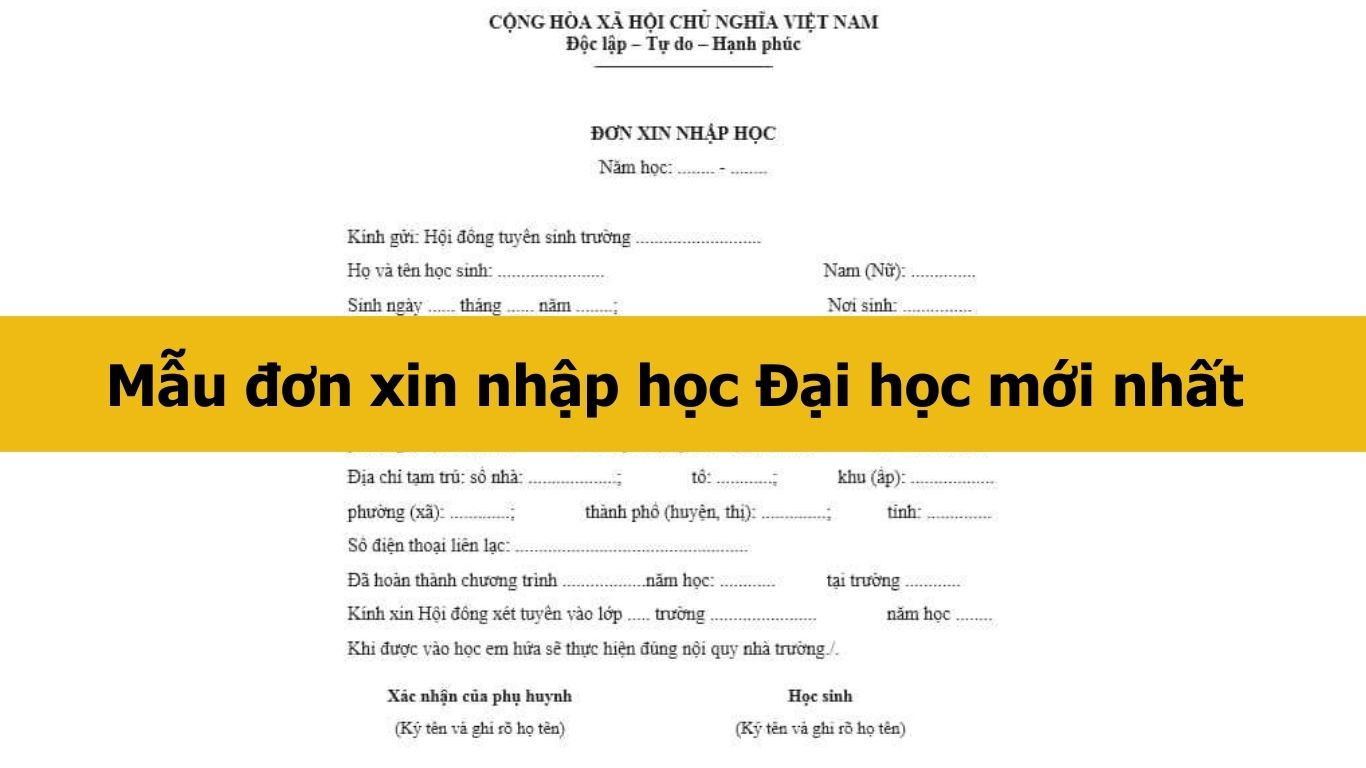
Mẫu đơn xin nhập học Đại học mới nhất 2025
Hiện nay, để chuyển đổi cấp học Đại học trong hệ thống giáo dục Việt Nam thì ngoài các tiêu chuẩn về trình độ, nhận thức còn có một thủ tục trước khi nhập vào cấp học này là phải có đơn xin nhập học. Nhiều phụ huynh còn phân vân chưa biết sử dụng mẫu đơn xin nhập học nào cho đúng. Qua bài viết này, chúng tôi sẽ giúp các bạn có được các mẫu đơn xin nhập học Đại học mới nhất và cách viết phù hợp. 20/01/2025Mẫu đơn xin nhập học THPT mới nhất 2025
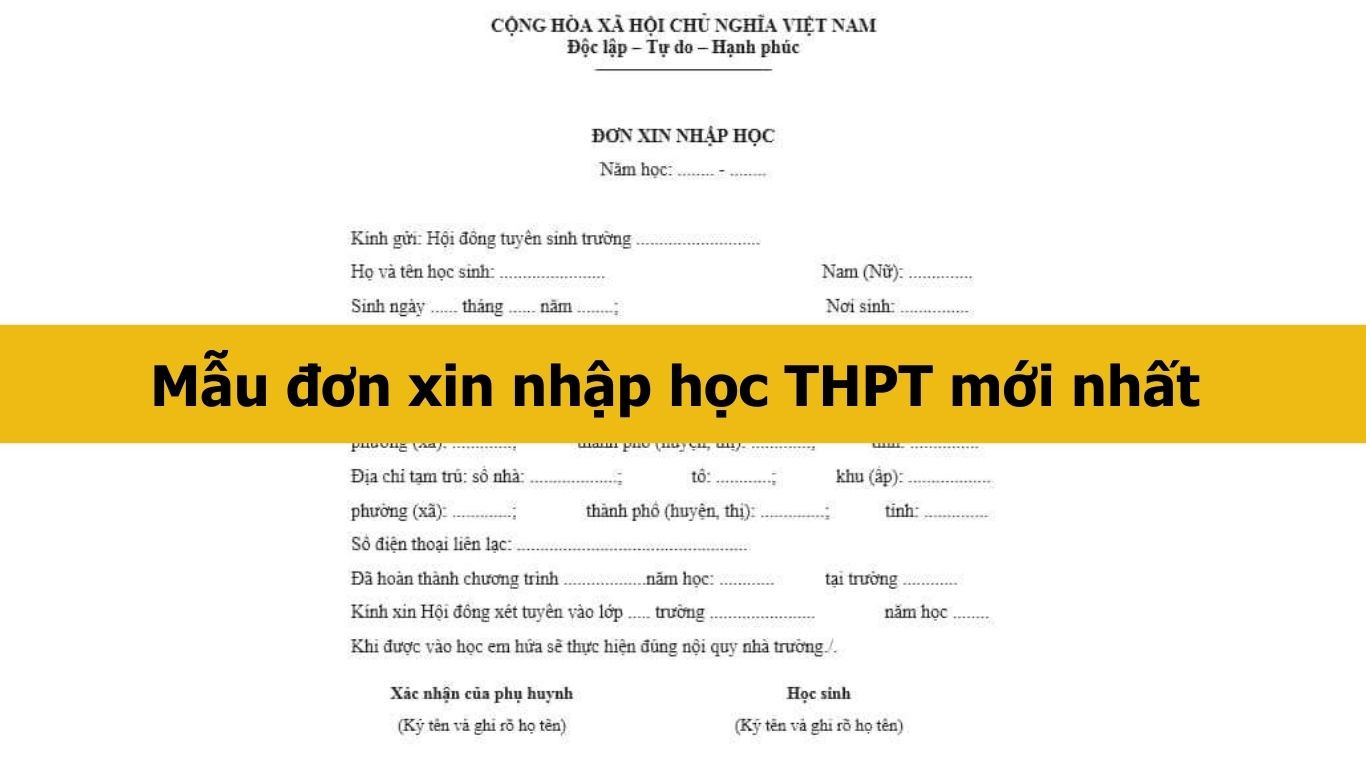
Mẫu đơn xin nhập học THPT mới nhất 2025
Hiện nay, để chuyển đổi cấp học THPT trong hệ thống giáo dục Việt Nam thì ngoài các tiêu chuẩn về trình độ, nhận thức còn có một thủ tục trước khi nhập vào cấp học này là phải có đơn xin nhập học. Nhiều phụ huynh còn phân vân chưa biết sử dụng mẫu đơn xin nhập học nào cho đúng. Qua bài viết này, chúng tôi sẽ giúp các bạn có được các mẫu đơn xin nhập học THPT mới nhất và cách viết phù hợp. 20/01/2025Mẫu đơn xin nhập học THCS mới nhất 2025
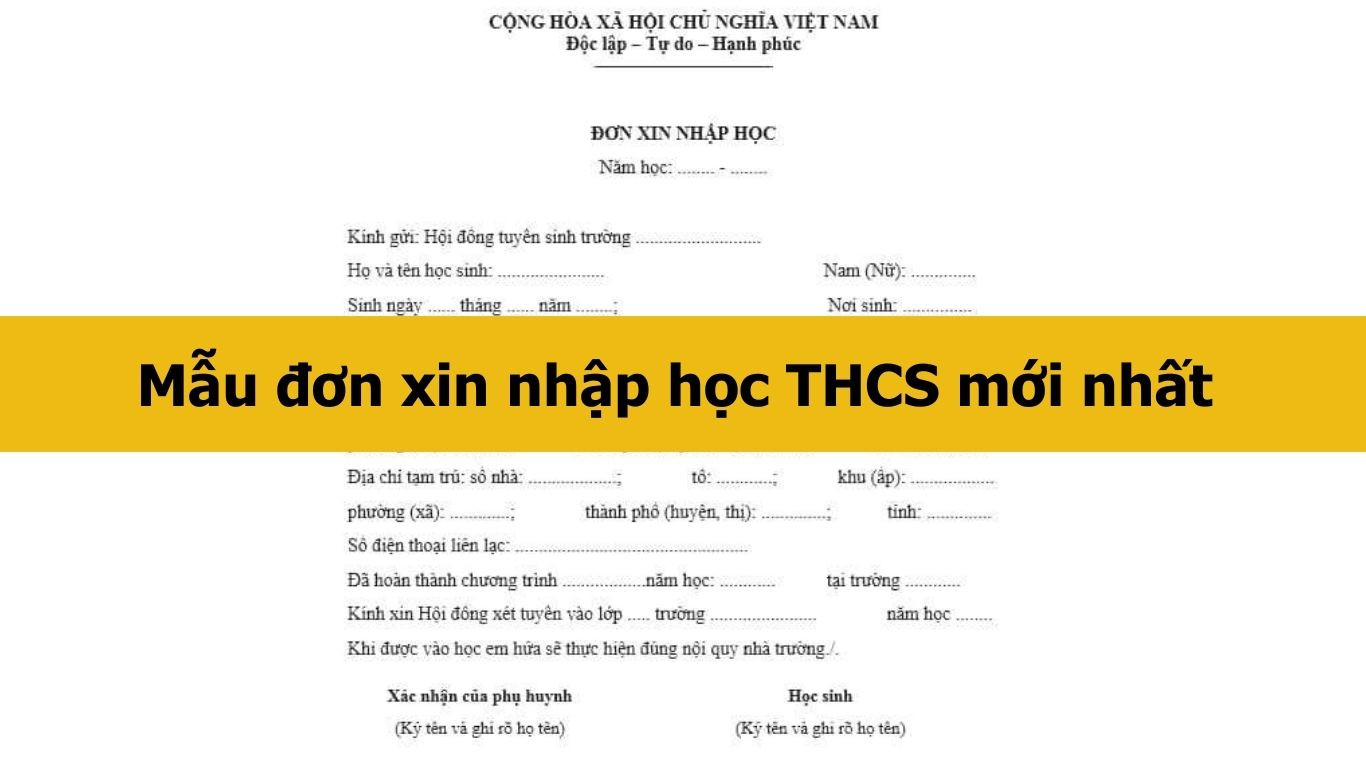
Mẫu đơn xin nhập học THCS mới nhất 2025
Hiện nay, để chuyển đổi cấp học THCS trong hệ thống giáo dục Việt Nam thì ngoài các tiêu chuẩn về trình độ, nhận thức còn có một thủ tục trước khi nhập vào cấp học này là phải có đơn xin nhập học. Nhiều phụ huynh còn phân vân chưa biết sử dụng mẫu đơn xin nhập học nào cho đúng. Qua bài viết này, chúng tôi sẽ giúp các bạn có được các mẫu đơn xin nhập học THCS mới nhất và cách viết phù hợp. 20/01/2025Mẫu đơn xin nhập học tiểu học mới nhất 2025
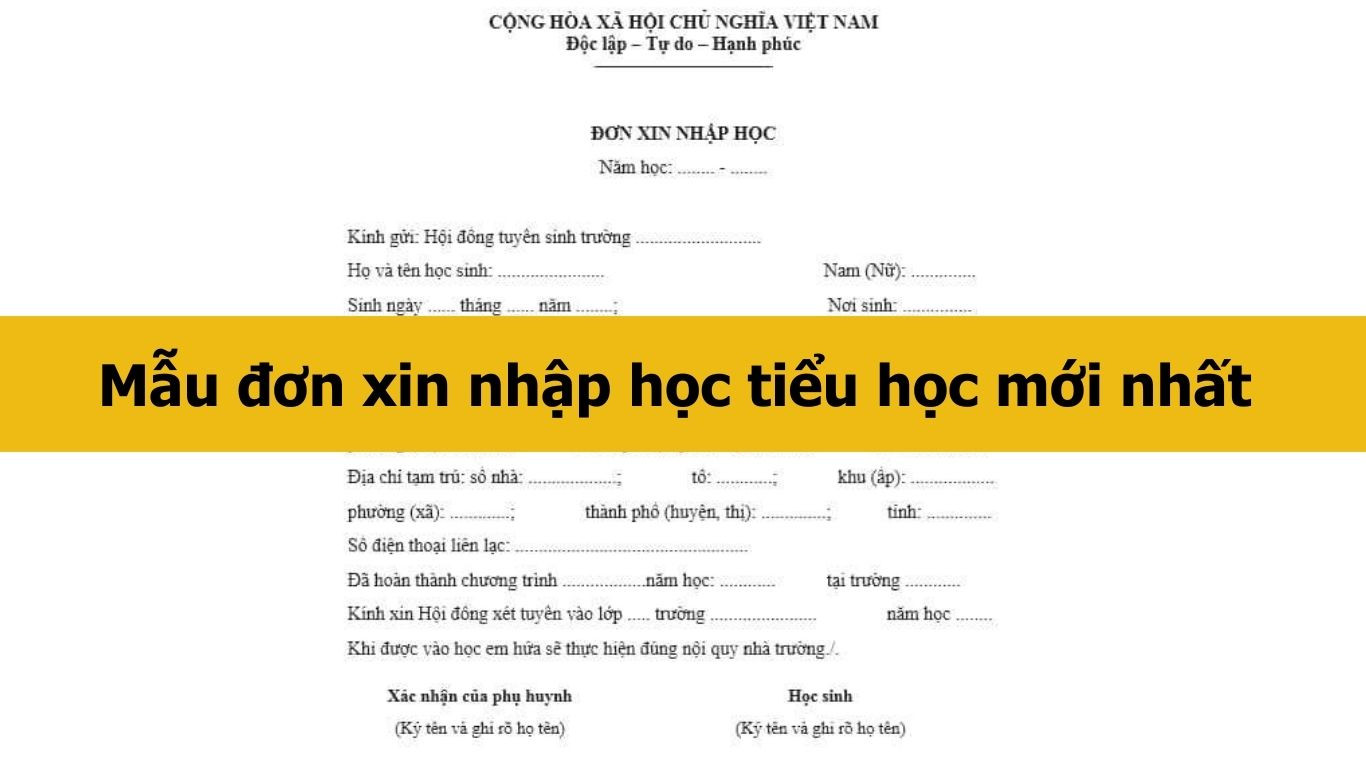
Mẫu đơn xin nhập học tiểu học mới nhất 2025
Hiện nay, để chuyển đổi cấp học tiểu học trong hệ thống giáo dục Việt Nam thì ngoài các tiêu chuẩn về trình độ, nhận thức còn có một thủ tục trước khi nhập vào cấp học này là phải có đơn xin nhập học. Nhiều phụ huynh còn phân vân chưa biết sử dụng mẫu đơn xin nhập học nào cho đúng. Qua bài viết này, chúng tôi sẽ giúp các bạn có được các mẫu đơn xin nhập học tiểu học mới nhất và cách viết phù hợp. 20/01/2025Mẫu đơn xin nhập học mầm non mới nhất 2025 và cách ghi chi tiết
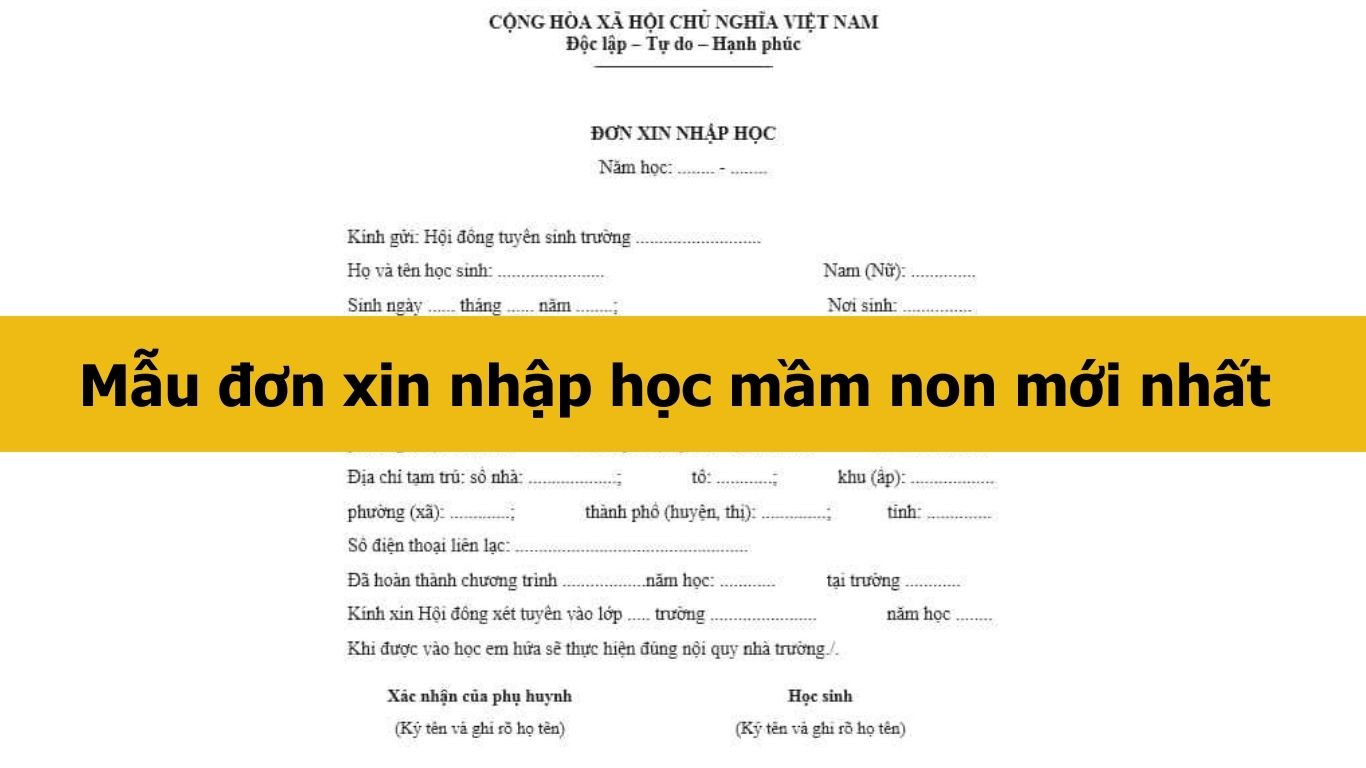
Mẫu đơn xin nhập học mầm non mới nhất 2025 và cách ghi chi tiết
Hiện nay, để chuyển đổi cấp học mầm non trong hệ thống giáo dục Việt Nam thì ngoài các tiêu chuẩn về trình độ, nhận thức còn có một thủ tục trước khi nhập vào cấp học này là phải có đơn xin nhập học. Nhiều phụ huynh còn phân vân chưa biết sử dụng mẫu đơn xin nhập học nào cho đúng. Qua bài viết này, chúng tôi sẽ giúp các bạn có được các mẫu đơn xin nhập học mầm non mới nhất và cách viết phù hợp. 20/01/202503 mẫu đơn xin nhập học mới nhất 2025 và hướng dẫn cách viết
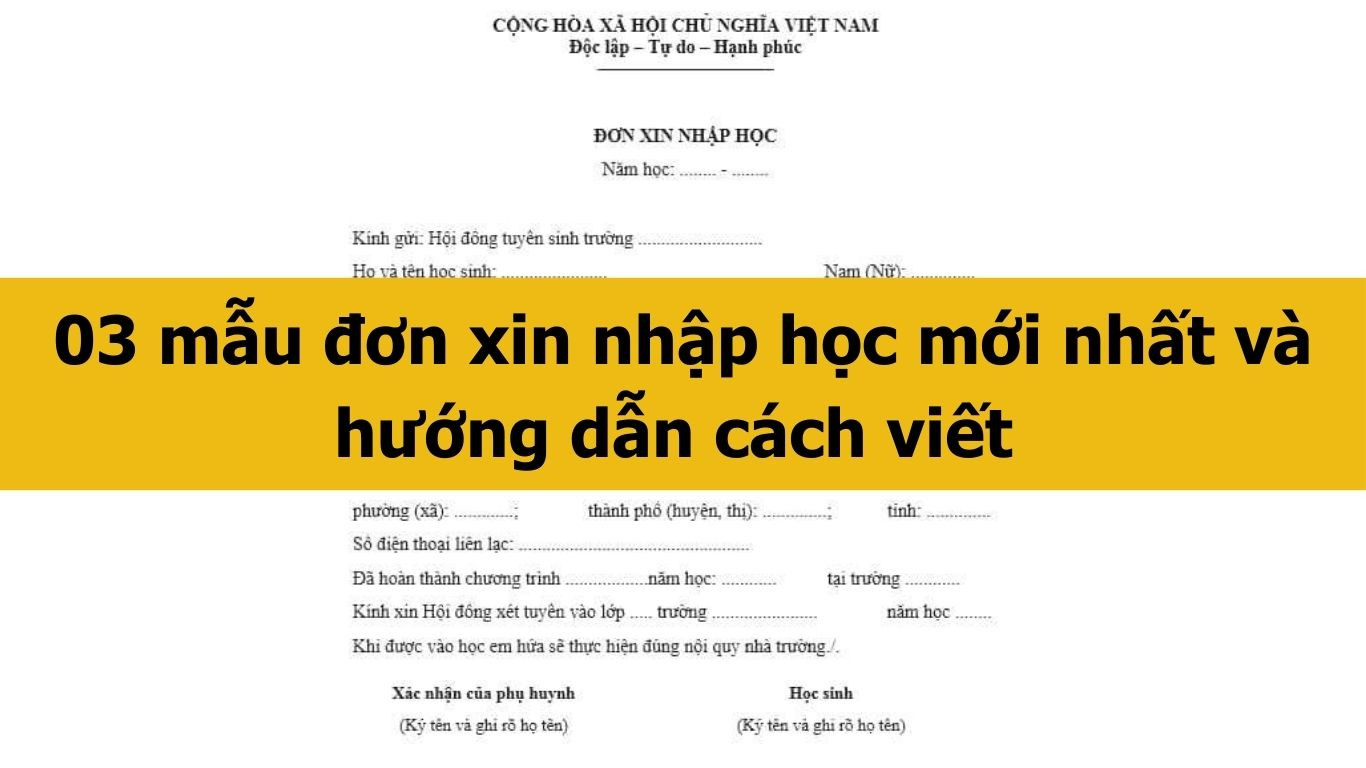
03 mẫu đơn xin nhập học mới nhất 2025 và hướng dẫn cách viết
Hiện nay, để chuyển đổi các cấp học trong hệ thống giáo dục Việt Nam thì ngoài các tiêu chuẩn về trình độ, nhận thức còn có một thủ tục trước khi nhập vào các cấp học là phải có đơn xin nhập học. Nhiều phụ huynh, học sinh còn phân vân chưa biết sử dụng mẫu đơn xin nhập học nào cho đúng. Qua bài viết này, chúng tôi sẽ giúp các bạn có được các mẫu đơn xin nhập học mới nhất và phù hợp. 20/01/2025Các hành vi bị nghiêm cấm với học sinh mới nhất 2025
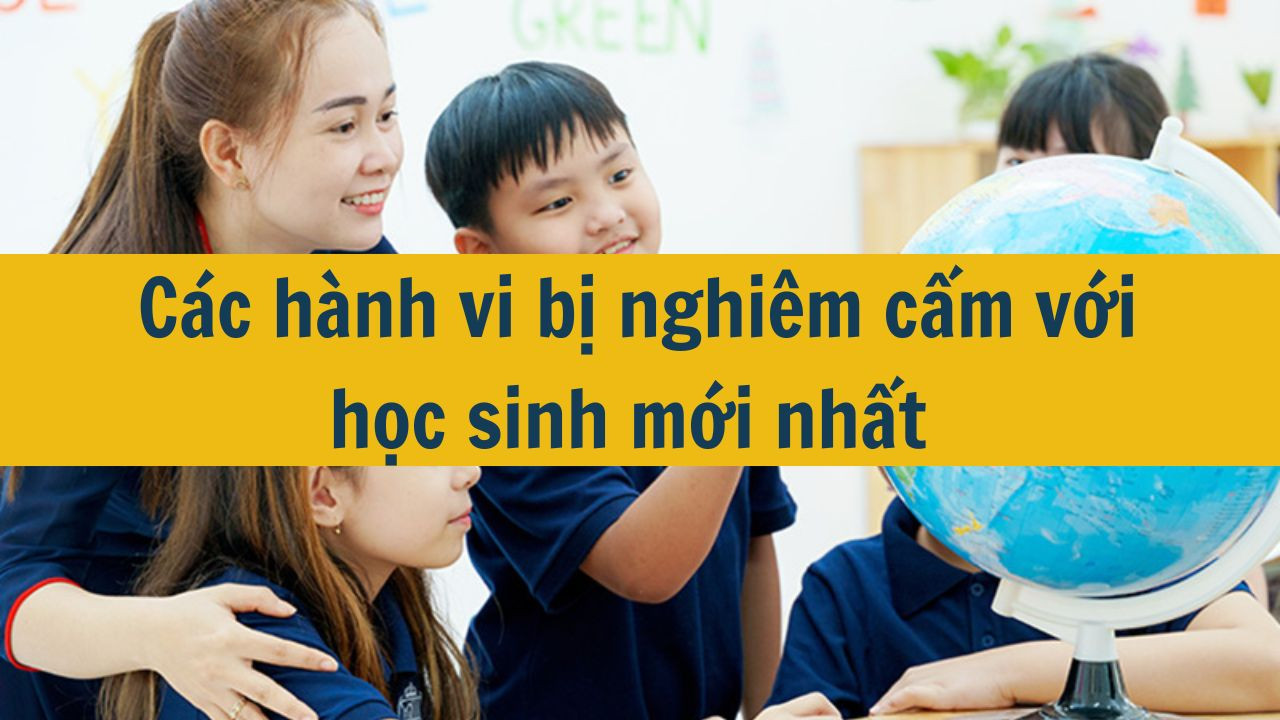
Các hành vi bị nghiêm cấm với học sinh mới nhất 2025
Bản cam kết học sinh được sử dụng phổ biến trong nhà trường, văn bản này giúp học sinh đặt ra các mục tiêu phấn đấu trong học tập để có động lực cố gắng. Các hành vi bị nghiêm cấm với học sinh mới nhất 2025. Bài viết sau đây sẽ làm rõ về các vấn đề này 14/01/2025Cách viết bản cam kết không tái phạm cho học sinh mới nhất 2025
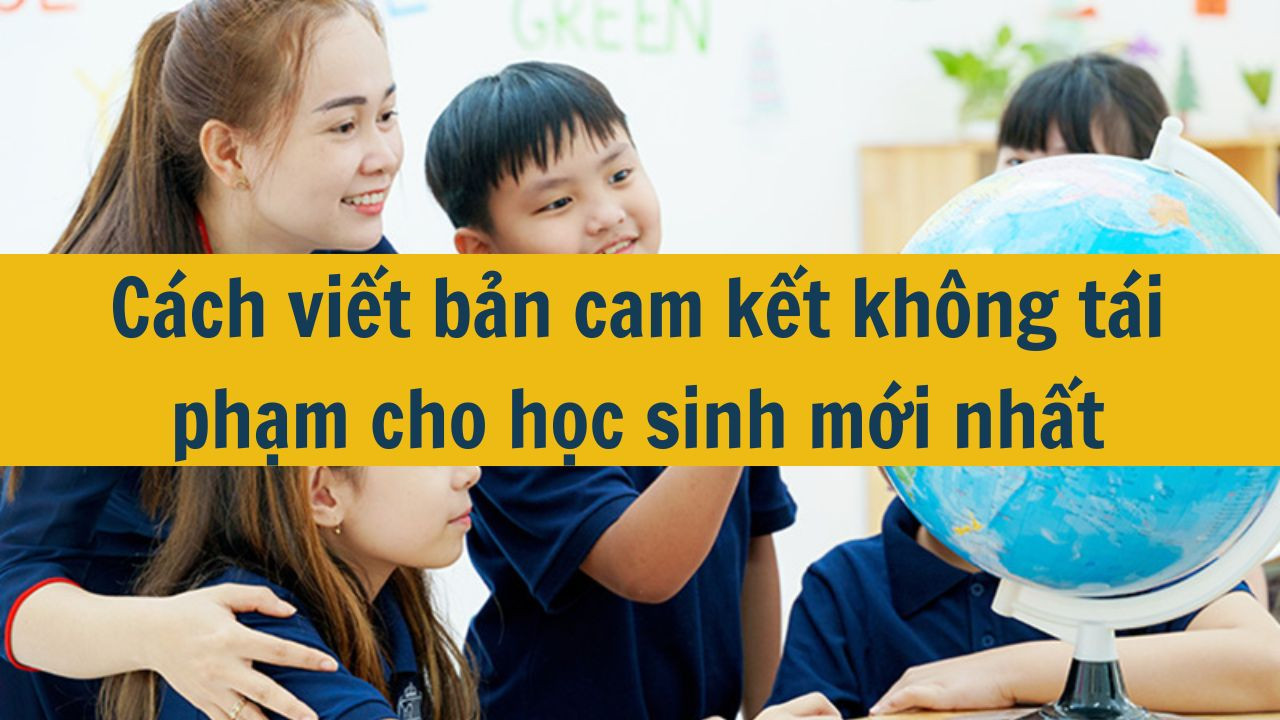
Cách viết bản cam kết không tái phạm cho học sinh mới nhất 2025
Bản cam kết học sinh được sử dụng phổ biến trong nhà trường, văn bản này giúp học sinh đặt ra các mục tiêu phấn đấu trong học tập để có động lực cố gắng. Vậy cách viết bản cam kết không tái phạm cho học sinh mới nhất 2025? Bài viết sau đây sẽ làm rõ về các vấn đề này. 14/01/202505 Mẫu bản cam kết của học sinh mới nhất 2025
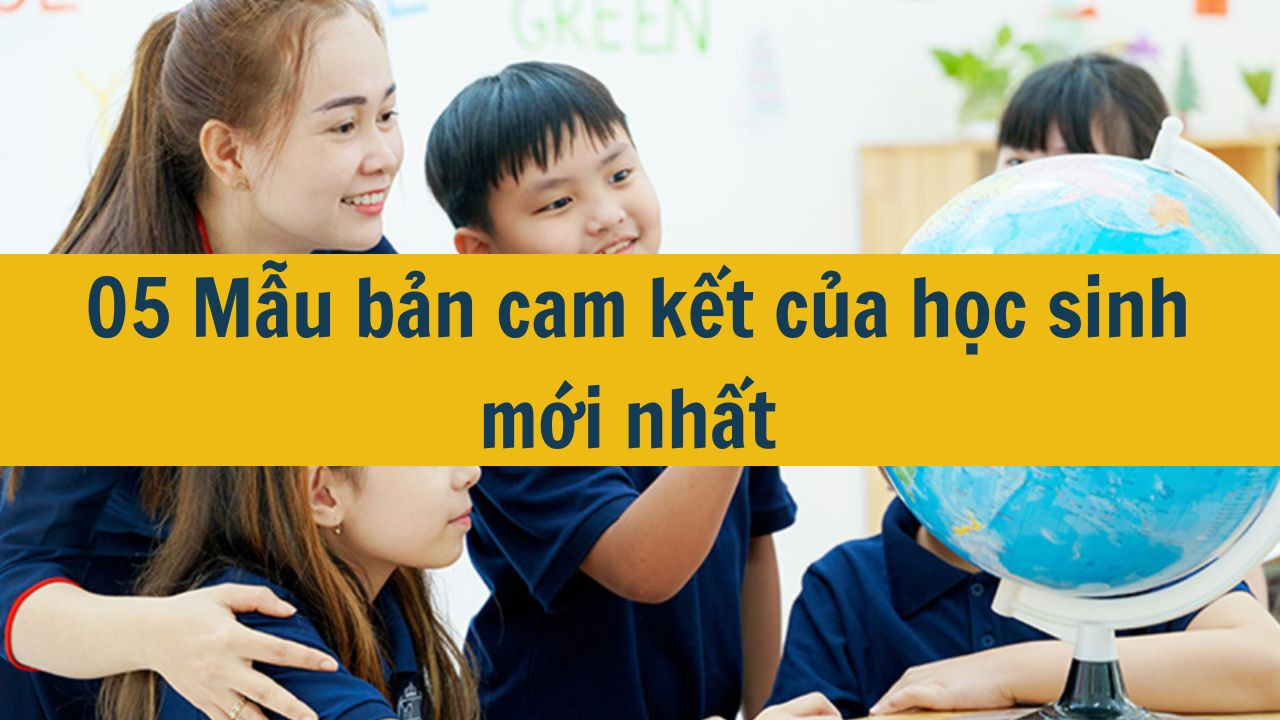
05 Mẫu bản cam kết của học sinh mới nhất 2025
Bản cam kết học sinh được sử dụng phổ biến trong nhà trường, văn bản này giúp học sinh đặt ra các mục tiêu phấn đấu trong học tập để có động lực cố gắng. 05 mẫu bản cam kết của học sinh mới nhất 2025. Bài viết sau đây sẽ làm rõ về các vấn đề này 11/01/2025Năm 2025 học giáo dục thường xuyên có bằng cấp 3 không? Bằng tốt nghiệp giáo dục thường xuyên có giá trị như bằng tốt nghiệp trung học phổ thông không?
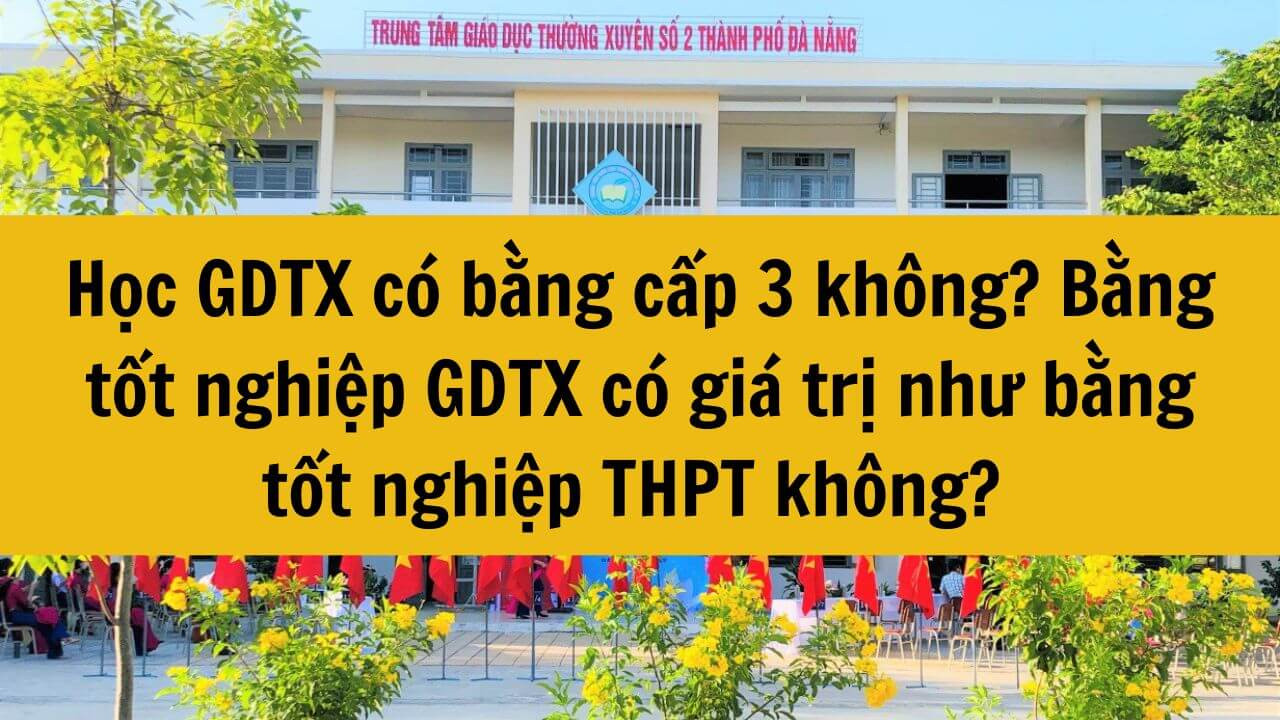

 Luật giáo dục 2019 (Bản Word)
Luật giáo dục 2019 (Bản Word)
 Luật giáo dục 2019 (Bản Pdf)
Luật giáo dục 2019 (Bản Pdf)